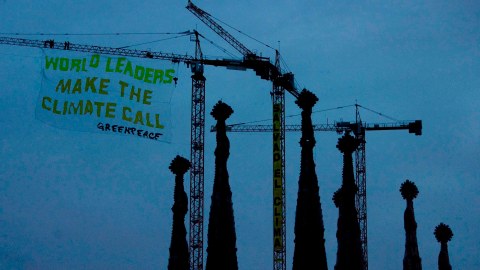United Nations Barcelona Climate Change Talks: Day 3

BARCELONA — The delegations of nearly every African country have walked out of the Barcelona Climate Change Talks after alleging that developed nations, including the United States, are not serious about mitigating the effects of climate change, which disproportionately affect developing countries like their own.
The event was seen as a major blow to what might be achieved in Barcelona, and perhaps more importantly, a shadow was cast over the approaching Copenhagen Climate Change Conference, billed by many longtime observers as a do-or-die moment for international consensus.
For developed economies, which rely more heavily on carbon emissions to drive industry and labor (literally), emissions reductions represent an economic setback. If the countries most responsible for carbon emissions will not commit to reductions, say African delegations, progress is simply not possible.
Perhaps the most popular solution to climate change among delegations in Barcelona is a global carbon market. In such a market, emissions ceilings would be set on individual companies by regulators, and when a company exceeds that limit, it pays a tax. The revenues from the tax are then used to mitigate climate change elsewhere.
The African delegations, and their partners in the developing world, agree that wealthy countries like the United States cannot escape the financial costs of global warming, a condition they are primarily responsible for.
When this view is met with approval among citizens of wealthier nations, that approval typically comes from members of non-governmental organizations. Matthias Duwe of the European Climate Action Network is one such ally. Speaking before a crowd at today’s conference, Duwe said developed national must also pay poorer nations for harms caused by climate change.
Following Duwe, indigenous peoples from the Philippines, Nicaragua and Kenya spoke about damage already done to their countries by climate change, ranging from typhoons to deforestation. Societies with simpler (less carbon-reliant) ways of life, they say, are suffering from the industrialized world’s ambition.
Ultimately, what UN climate scientists say is necessary to avoid further harms, and what the delegations of developed nations are promising to do about it, are two very different things.
One calculation cited today is especially stark: to limit global temperatures to a two degree increase through 2020, the world must achieve a 40% reduction in greenhouse gas output (relative to 1990 levels). The estimated $120 billion needed annually to achieve that goal, however, remains almost entirely uncommitted.
According to the European Climate Change Programme, a global carbon market could produce $30 billion annually, but that leaves $90 billion remaining, or three-fourths of what is needed to mitigate warming each year.
—





